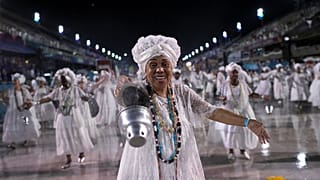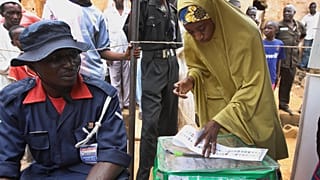Brazil
People in the historical town of Pirenópolis in central Brazil celebrated Monday a religious and cultural festival held annually around the Christian holiday of Pentecost.
The Festa do Divino Espírito Santo - or the Festival of the Divine Holy Spirit, blends Catholic traditions with popular folklore and theatrical performance, dating back to the early 19th century.
Knights charge at each other at what is usually a football festival. These are the Cavalhadas. People dressed as cavalry symbolise medieval battles between Christian knights and Moors.
Meanwhile masked riders, mascarados, are there to add fun and humour to the celebration. Their identity is kept secret.
“It would not work if there were only the knights without the masked riders." said one mascarado, his face hidden behind a black mask with rows of square teeth. "It's the whole that makes this beautiful festival happen for almost 200 years.”
The festival features religions processions, masses, and symbolic rituals like the coronation of the “Emperor of the Divine.”
Recognized as Intangible Cultural Heritage by Brazil’s National Institute of Historic and Artistic Heritage (IPHAN), the celebration highlights the country's colonial roots while blending Catholic faith with Afro-Brazilian expression.
For the people of Pirenópolis, the festival is a point of pride and a strong part of their identity. It brings the community together across generations to organize the events, maintain traditions, and share their culture with visitors.
Locals value see the festival as a way to preserve their history and celebrate what makes their town unique.











01:56
Benin's lovers less row-mantic as apps replace waterway rendezvous
01:00
Japan: Akiba Festival draws crowds despite winter cold
01:00
Vienna Opera Ball dazzles 5,500 guests at Austria’s grand gala
Go to video
Kenya starvation cult preacher Paul Mackenzie charged over 52 more deaths
Go to video
Why Ghana’s Parliament swapped suits for smocks
00:48
"Amadou and Mariam: Sounds of Mali" documents life of singing duo